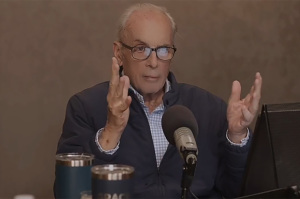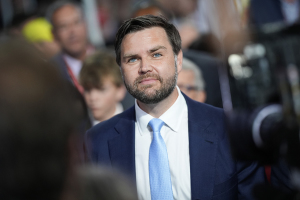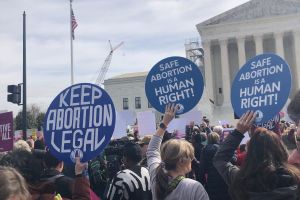S.C. GOP Forum Focuses on Constitutional Issues
Labor Day may have been a holiday for many Americans, but five of the top six Republican presidential candidates were hard at work trying to convince South Carolina voters they are ready to replace President Obama next fall. The GOP candidates were asked about their policy views on a number of topics at the Palmetto Freedom Forum on Monday.
The South Carolina event, hosted by the American Principles Project, was co-founded by Dr. Robert P. George, McCormick Professor of Jurisprudence at Princeton University. George was one of the panelists asking questions, along with South Carolina GOP Senator Jim DeMint and Congressman Steve King (R-Iowa).
The presence of DeMint at the Labor Day forum likely influenced the participation of most of the candidates, especially former Massachusetts Governor Mitt Romney, who initially declined the invitation. DeMint's endorsement is highly coveted among the candidates because of his influence in the Tea Party and in South Carolina, an early primary state that has a reputation for deciding many of the previous Republican nominees.
Minnesota Congresswoman Michele Bachmann, Texas Congressman Ron Paul, former Godfather's Pizza CEO and Fed Chair Herman Cain, and former Speaker of the House Newt Gingrich participated in the event.
The current front-runner, Texas Governor Rick Perry, was scheduled to attend, but made the decision Monday morning to return to his state in order to help deal with the state's wildfires, which are now threatening the metropolitan area of Austin, the state capital. DeMint expressed disappointment that Perry would not attend, but acknowledged that he had good reason.
The fact that Perry entered the race and took front-runner status away from Romney, most likely influenced the former Massachusetts governor to reconsider and attend Monday’s event.
Each candidate appeared on stage separately while the other candidates were sequestered behind the stage so they could not hear the other’s responses. Each made an opening statement in which they were asked to explain their principles of government and their understanding of federalism. Then, each of the panelists asked a few questions, which, most of the time was the same questions they asked the other candidates.
George's first question to each candidate was about abortion. He noted that section 5 of the 14th Amendment gives Congress the authority to make any law necessary to enforce the previous sections of the Amendment, which includes, notably, the Equal Protection Clause of the 14th Amendment. George then asked if they would support a law passed by Congress, under this authority that would define life as beginning at conception thus outlawing abortion in all 50 states.
The candidate’s answers to this question revealed not only their views on abortion, but also their views on federalism, or state's relationship to the federal government.
Bachmann, Cain and Gingrich all said that they would support such a law passed by Congress. Paul and Romney, on the other hand, said they would not.
Paul said he would support an effort to remove jurisdiction from the federal courts to see abortion cases, which would effectively let each state decide the legality of abortion. Paul also disagreed with the premise of George's question, saying that George was reading into the 14th amendment a repeal of the 10th amendment (which says that powers not given to the federal government are left to the states).
Romney said that his preference for dealing with abortion is to appoint justices that would repeal Roe v. Wade (1973) and return the issue to the states. George's strategy “would create a constitutional crisis,” according to Romney.
At a previous debate, Bachmann had said that she favors state's rights and that an individual mandate to purchase health insurance is unconstitutional under the federal Constitution. George attempted to get Bachmann to further explain that position. “Do you believe the national Constitution forbids states from [requiring its citizens to purchase health insurance]?” George asked.
“I believe it is inherent in the Constitution,” Bachmann replied.
“So, to say it is inherent sounds like there's not a particular provision you can point to,” George countered.
“Well I'm sure you could enlighten me on that,” Bachmann answered to laughter from George and the audience.
“Well I wanted to know what the provision was,” George said as the moderator announced that Bachmann was out of time.
When Cain was asked how he would help put Americans back to work, he said he would reform the tax code by eliminating all deductions and credits, because “it allows bureaucrats to pick winners and losers,” and replace the current tax code with his “9-9-9” plan. The 9-9-9 plan would institute a 9 percent corporate income tax, 9 percent personal income tax, and 9 percent sales tax. Cain also clarified that he sees the 9-9-9 plan as a precursor to the “fair tax,” which is a national sales tax.
Gingrich displayed his knowledge of history by frequently citing figures such as Abraham Lincoln and Thomas Jefferson, and particular facts about legislation. He also drew laughter from the audience and panelists after he told King that his highest priority as president “would be the King bill to repeal Obamacare.”
Romney seemed more at ease answering questions about the economy than abortion and marriage. He said he supported repeal of Dodd-Frank, Sarbanes-Oxley and the Community Investment Act, bills that regulated the financial services industry, and the privatization of Fannie Mae and Freddie Mac.
He also pointed out, though, that it is appropriate for Congress to regulate financial services, especially in light of the problems that led to the financial crisis. “Regulation is necessary to make a free market work.”
Romney was also asked how he would make difficult decisions if he were president. He said that he analyze all the information he had on the decision, talk to his wife, and, “go down on my knees.”
After the forum, the panelists made some comments and answered some questions. George said, “I think we showed that [debates] can be done better than when the media controls it.” He noted that they did not ask any “gotcha questions,” as Gingrich said in the previous debate, and they did not ask Cain, former CEO of Godfather's Pizza, if he prefers deep dish or thin sliced pizza. Cain was asked that question at a previous debate hosted by CNN.
In answer to an audience question, George said, “the marriage between economic and social conservatives is not a marriage of convenience,” because they are both based upon the same principles. He noted, for instance, that healthy marriages help keep people out of poverty and help the economy.





























